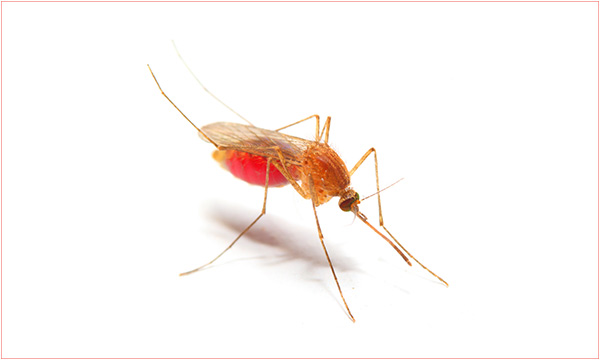Microbe discovered which prevents mosquitoes from harbouring malaria parasite
1/17/24
Scientific research, in which a researcher from the Universidad Carlos III de Madrid (UC3M) has participated, has identified a bacteria that prevents the malaria parasite from completing its cycle inside mosquitoes. This advance, recently published in the journal Science, could provide an additional weapon against the spread of malaria in the world.

According to World Health Organisation (WHO), the number of people contracting malaria is increasing. Specifically, there were an estimated 249 million malaria cases worldwide in 2022: 5 million more than in 2021 and 16 million above the pre-pandemic level of 233 million recorded in 2019. In addition to the disruptions caused by COVID-19, the global response to this disease has faced a growing number of threats, such as drug and insecticide resistance, humanitarian crises, resource constraints, the effects of climate change and delays in programme implementation, according to the WHO. Each year more than half a million people die from this disease, most of them children under 5 years of age. Although some vaccines have been developed, their effectiveness is limited and they are still in the early stages of implementation in Africa.
The use of microorganisms to control mosquito-borne diseases has been used before. However, most methods to block the development of malaria-causing Plasmodium parasites transmitted by different species of mosquitoes have been based on genetically modified bacteria. The Delftia tsuruhatensis bacteria featured in this new research published in Science, one of the world's leading scientific journals, inhibits the malaria parasite and is naturally present in the environment.
The study's authors came across the microbe by chance, after noticing that a colony of mosquitoes they were using in GlaxoSmithKline (GSK) research for new drug development were becoming increasingly difficult to infect with Plasmodium. They later found that all the samples contained a bacterial strain called Delftia tsuruhatensis TC1, which they discovered slows the growth of Plasmodium in the mosquito's intestine, where the parasite develops before moving into the insect's salivary glands. Experiments with rodents carried out at Johns Hopkins University (USA) revealed that this disruption of Plasmodium growth led to a reduction in transmission: only a third of mice bitten by mosquitoes carrying these bacteria became infected, compared with 100% of mice bitten by mosquitoes not repopulated with the bacteria. They also found that mosquitoes only need to eat a few bacteria to be colonised and that, once inside the insect, the bacteria remain there, continually blocking the parasite's development.
Field studies carried out in Burkina Faso and modelling have shown that Delftia tsuruhatensis TC1 has the potential to complement malaria transmission control. In fact, according to the results of the study, this bacterium can reduce the parasite load in mosquitoes by up to 73%, thanks to the production of a molecule, called harmane, which is also found in plants used in traditional medicine in some cultures.
"The identification of a bacteria that prevents the development of the parasite stages that occur in mosquitoes without affecting them provides a novel approach with very little chance of developing resistance, since it is not detrimental to the mosquitoes," explains one of the study's authors, Alfonso Mendoza Losana, currently a distinguished researcher in UC3M's Bioengineering Department and initiator of the project at GSK. "In addition, it is a non-genetically modified bacteria, which allows for rapid introduction in the field," he highlights.
This idea has been patented by GSK and Alfonso Mendoza Losana is one of the two authors of this innovation to reduce malaria transmission. In addition, this research has received funding from GSK Spain, the Bill and Melinda Gates Foundation and the British government's Foreign and Commonwealth Office.
Bibliographic reference: Huang, W. et al (2023). Delftia tsuruhatensis TC1 symbiont suppresses malaria transmission by anopheline mosquitoes. Science. 381 (6657):533–540. DOI: 10.1126/science.adf8141 https://www.science.org/doi/10.1126/science.adf8141

